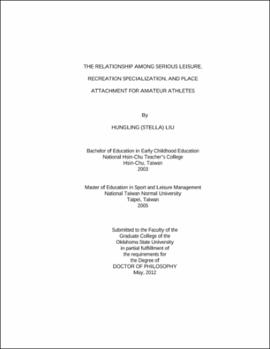| dc.contributor.advisor | Caneday, Lowell | |
| dc.contributor.author | Liu, Hungling (Stella) | |
| dc.date.accessioned | 2013-11-26T08:34:41Z | |
| dc.date.available | 2013-11-26T08:34:41Z | |
| dc.date.issued | 2012-05 | |
| dc.identifier.uri | https://hdl.handle.net/11244/7487 | |
| dc.description.abstract | Scope and Method of Study: | |
| dc.description.abstract | Leisure is a central and dominant aspect of an individual's daily life, and serious leisure theory could be used to understand individuals' systematic pursuit for their leisure. A recreation setting can facilitate or hinder not only the recreation activity itself but also the perceived quality experience of recreationalists. Therefore, the purpose of the study is to investigate how the systematic leisure pursuit and leisure commitment vary relative to the relationship of people and a particular place (place attachment). The amateur athletes, including softball and volleyball, enrolled in the adult sports program in the City of Stillwater, Oklahoma in fall 2011, were the target population in the study. The structural equation modeling and path analysis were applied in the study to investigate the causal relationship among serious leisure, recreation specialization, and place attachment and to compare the relationships among their sub-dimensions. | |
| dc.description.abstract | Findings and Conclusions: | |
| dc.description.abstract | The research findings show that amateur athletes who were serious with their leisure pursuit not only have higher possibility to develop their career in their leisure but also are more willing to overcome the difficulties on their way of pursuing leisure. The characteristic of serious leisure is positively related to the players' level of specialization and creates indirect impact with emotional attachment to a specific physical setting through recreation specialization. However, the direct and positive relationship between serious leisure and place attachment was not approved in the data set. In addition, in terms of the relationship among dimensions, the identity and ethos of serious leisure had significant impacts on lifestyle dimension in recreation specialization. The lifestyle dimension in specialization was the best indicator to predict the participants' attachment to the place. The identity and ethos of serious leisure were also considered as significant factors to create place attachment within the social bonding concept. | |
| dc.format | application/pdf | |
| dc.language | en_US | |
| dc.rights | Copyright is held by the author who has granted the Oklahoma State University Library the non-exclusive right to share this material in its institutional repository. Contact Digital Library Services at lib-dls@okstate.edu or 405-744-9161 for the permission policy on the use, reproduction or distribution of this material. | |
| dc.title | Relationship among serious leisure, recreation specialization, and place attachment for amateur athletes | |
| dc.contributor.committeeMember | Lindenmeier, Donna K. | |
| dc.contributor.committeeMember | Tapps, Tyler | |
| dc.contributor.committeeMember | Wilke, Thomas A. | |
| osu.filename | Liu_okstate_0664D_11986.pdf | |
| osu.accesstype | Open Access | |
| dc.type.genre | Dissertation | |
| dc.type.material | Text | |
| dc.subject.keywords | place attachment | |
| dc.subject.keywords | recreation specialization | |
| dc.subject.keywords | serious leisure | |
| thesis.degree.discipline | Health, Leisure and Human Performance | |
| thesis.degree.grantor | Oklahoma State University | |
